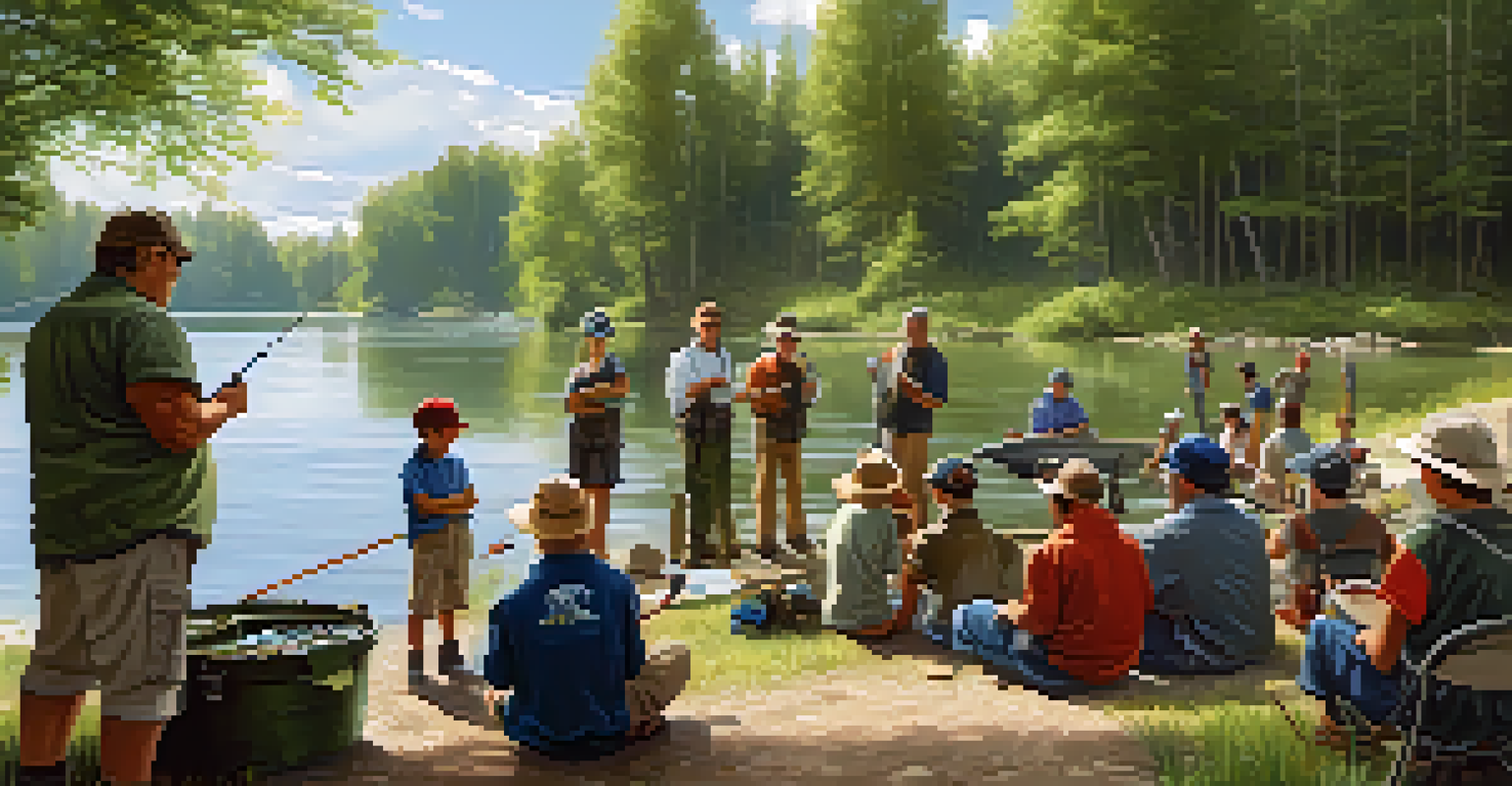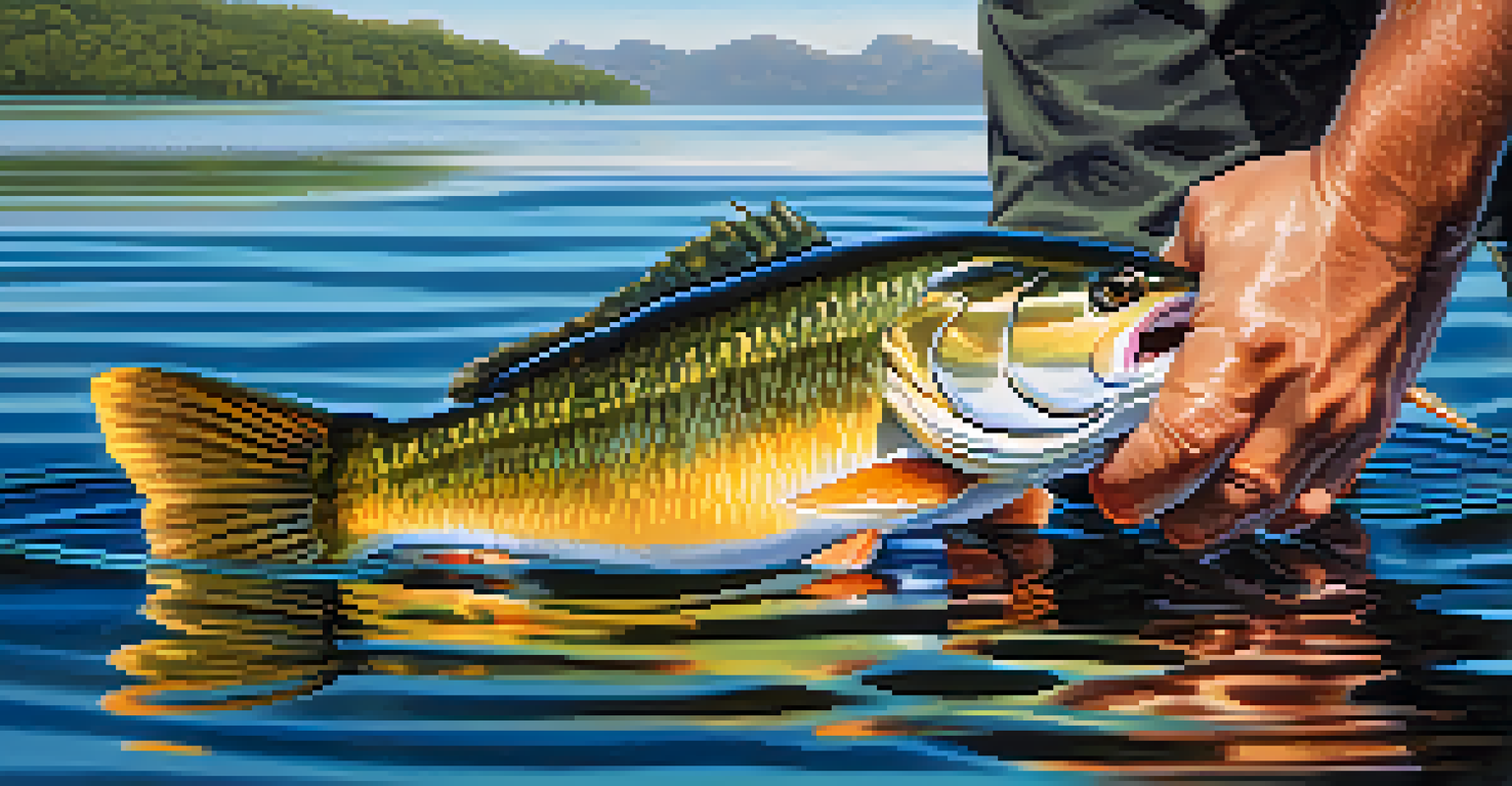Understanding Fishing Ethics: Importance for All Anglers

What Are Fishing Ethics and Why Do They Matter?
Fishing ethics refer to the moral principles that guide anglers in their sport. They encompass respect for the environment, fellow anglers, and the fish themselves. Understanding these ethics is crucial, as it helps ensure that fishing remains a sustainable activity for future generations.
Fishing is much more than fish. It is the great occasion when we may return to the fine simplicity of our forefathers.
When anglers practice good ethics, they contribute to healthier ecosystems and promote responsible fishing practices. This not only helps in preserving fish populations but also enhances the overall experience for everyone involved. Ethical fishing fosters a sense of community among anglers, encouraging a shared commitment to conservation.
Moreover, fishing ethics often intersect with legal regulations, which are designed to protect natural resources. Adhering to these guidelines not only keeps you within the law but also aligns your actions with a broader ethical framework. In essence, following fishing ethics enriches the sport and secures its future.
The Role of Conservation in Fishing Ethics
Conservation is at the heart of fishing ethics, emphasizing the need to protect fish habitats and populations. By practicing catch and release, for instance, anglers can help maintain healthy fish communities while still enjoying their hobby. This practice teaches respect for the fish and encourages others to do the same.

Additionally, being aware of seasonal regulations and size limits is essential for conservation efforts. These rules are implemented to allow fish populations to spawn and thrive. When anglers comply with these guidelines, they contribute to a sustainable fishing environment that benefits everyone.
Fishing Ethics Promote Sustainability
Practicing fishing ethics helps preserve fish populations and ensures that fishing remains a sustainable activity for future generations.
Ultimately, the commitment to conservation reflects an angler's respect for nature. By prioritizing the health of aquatic ecosystems, anglers not only enhance their fishing experience but also take part in a larger movement toward environmental stewardship.
Respecting Fellow Anglers and Their Space
Respecting others on the water is a fundamental aspect of fishing ethics. This includes maintaining a safe distance from fellow anglers, minimizing noise, and being courteous when sharing fishing spots. By fostering a respectful atmosphere, the experience becomes enjoyable for everyone involved.
The fish is not the only thing we catch when we fish. We catch respect, friendship, and a sense of belonging.
Another important aspect is understanding the unwritten rules of fishing etiquette, such as not crowding someone's fishing area or interrupting their casting. These practices show consideration for others and promote a sense of camaraderie among anglers. When everyone follows these basic principles, the fishing community thrives.
In addition, sharing knowledge and tips can enhance the experience for everyone. Engaging with fellow anglers, discussing techniques, or sharing insights about local fishing spots cultivates a supportive community. This mutual respect not only strengthens bonds but also elevates the overall experience of fishing.
The Importance of Responsible Gear Use
Using the right gear responsibly is another critical component of fishing ethics. This means selecting equipment that is appropriate for the species being targeted and the environment. Overusing heavy tackle or inappropriate bait can lead to unnecessary harm to fish populations and their habitats.
Furthermore, anglers should be mindful of the environmental impact of their gear. Choosing biodegradable fishing lines, for instance, can reduce pollution in waterways. Responsible gear use is not only an ethical choice but also reflects an angler's commitment to preserving nature.
Respecting Anglers Enhances Experience
Fostering respect among fellow anglers creates a positive atmosphere that contributes to a thriving fishing community.
Ultimately, being responsible with gear helps to create a sustainable fishing culture. By prioritizing environmentally-friendly equipment and practices, anglers can contribute to a healthier ecosystem. This, in turn, enhances the fishing experience for everyone and ensures that future generations can enjoy the sport.
Educating Others on Fishing Ethics
One of the most impactful ways to promote fishing ethics is through education. By sharing knowledge about responsible fishing practices with newcomers, seasoned anglers can help create a more conscientious fishing community. This might include discussing the importance of conservation, ethical gear use, and respectful behavior on the water.
Workshops, community events, or informal gatherings can serve as platforms for sharing this valuable information. Encouraging discussions about fishing ethics can inspire others to adopt these principles in their own practices. When education is prioritized, it cultivates a culture of responsibility and respect.
Moreover, mentoring young anglers is a great way to instill ethical values from the start. By guiding them through the nuances of responsible fishing, we ensure that the next generation continues to uphold these important principles. This commitment to education reinforces the idea that fishing ethics are vital for the future of the sport.
Understanding Local Regulations and Their Impact
Local fishing regulations are designed to protect fish populations and their habitats, making it essential for anglers to understand and follow them. These regulations can vary significantly based on location, time of year, and species targeted. Familiarizing yourself with these rules ensures that you are fishing ethically and contributing to conservation efforts.
Failing to adhere to local regulations can lead to overfishing, habitat destruction, and even legal consequences. By respecting these guidelines, anglers help to sustain fish populations and maintain the balance of aquatic ecosystems. This commitment reflects a broader responsibility to preserve nature for future generations.
Education is Key to Ethical Practices
Sharing knowledge about fishing ethics with newcomers encourages responsible practices and reinforces the importance of conservation.
In addition, engaging with local fish and wildlife agencies can provide valuable insights into conservation efforts in your area. Many organizations offer resources and workshops to educate anglers about the importance of regulations. By staying informed, you can better appreciate the role these rules play in promoting ethical fishing.
The Benefits of Practicing Fishing Ethics
Practicing fishing ethics yields numerous benefits for both the environment and the angler. For starters, it helps maintain healthy fish populations and ecosystems, ensuring that future generations can enjoy fishing. Ethical practices also enhance the quality of the fishing experience, as respectful behavior fosters a positive community atmosphere.
Moreover, adhering to fishing ethics can lead to a greater sense of fulfillment for anglers. Knowing that you are contributing to conservation efforts and respecting your fellow anglers can deepen your connection to the sport. This sense of purpose enhances the joy of fishing beyond simply catching fish.

Lastly, promoting fishing ethics can elevate the reputation of the angling community as a whole. When anglers demonstrate responsible behavior, it fosters goodwill among the public and encourages more people to engage in the sport. This collective commitment to ethical practices ultimately ensures a vibrant future for fishing.